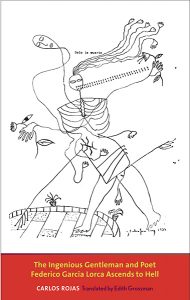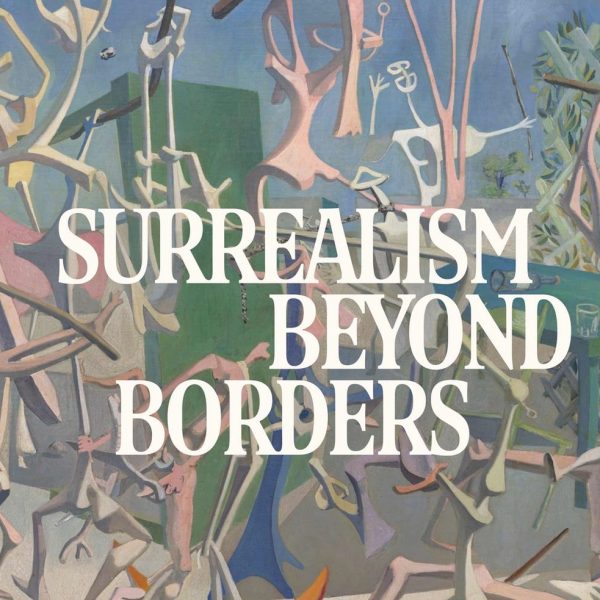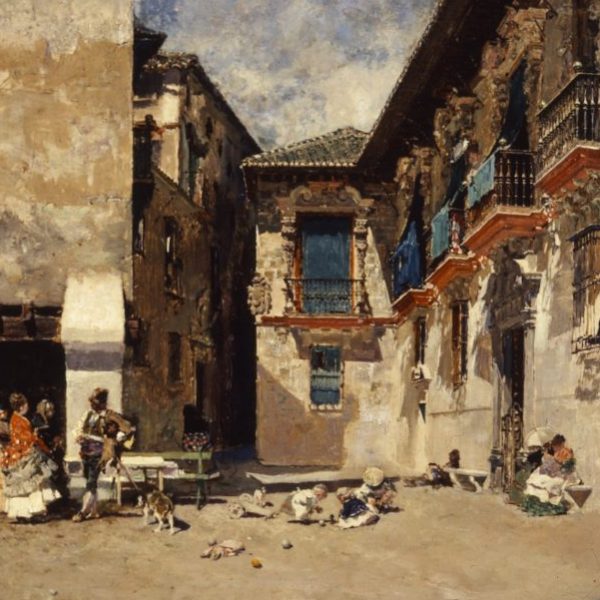An Interview with Carlos Rojas and Edith Grossman on The Ingenious Gentleman and Poet Federico García Lorca Ascends to Hell
 Following last night’s book launch event at the Cervantes Institute, New York, the Margellos World Republic of Letters and Yale University Press are pleased to announce today’s publication in English of Carlos Rojas‘ novel, The Ingenious Gentleman and Poet Federico García Lorca Ascends to Hell, masterfully translated by Edith Grossman. Here we present a conversation between author and translator on the details of the novel and the dialogue inherently created by the art of translation.
Following last night’s book launch event at the Cervantes Institute, New York, the Margellos World Republic of Letters and Yale University Press are pleased to announce today’s publication in English of Carlos Rojas‘ novel, The Ingenious Gentleman and Poet Federico García Lorca Ascends to Hell, masterfully translated by Edith Grossman. Here we present a conversation between author and translator on the details of the novel and the dialogue inherently created by the art of translation.
Yale University Press/Margellos World Republic of Letters: Professor Rojas, your works have been translated into English, French, German, Hungarian, and several Slavic languages. Are some languages more “fitting” than others for the translation of your prose? What is the experience like reading your own work in a different language?
Professor Grossman, are there peculiar challenges associated with translating from Spanish? What were some of the specific challenges in translating this novel in particular? Could you please give an example of a particularly difficult or ambiguous passage?
Carlos Rojas: Of all the main languages into which my books have been translated English, French. German, and Russian, I know only English and French. Profs. Grossman and Michel Mouret translated The Ingenious Gentleman and Poet in the idioms of Poe and Proust. As they progressed in their work they discovered and discussed with me new and revealing aspects of the novel that I had overlooked because, as Salvador Dalí truthfully said, nothing is harder than understanding what you have painted or written. And more of the same happened to me with Profs. Cecilia Lee, Alma Amell, and Diana Glad when they rendered into English other books of mine.
Edith Grossman: The challenges of translating from Spanish to English, or from any language to any other language, are the result of inherent differences in syntax, lexicon, grammar, and so forth. I think the greatest difficulty for me in translating The Ingenious Gentleman was the quantity of historical references. I checked all of them, which was time-consuming but enlightening.
 YUP/WRL: Do you see the translator as an outsider to the text or as an insider and a covert commentator? Do you try to disengage yourself from the work you are translating and from your own attitudes to it (insofar as such distance is attainable)? Or, on the contrary, do you believe it is important for the translator to have a specific affiliation with the original text? Is the translator’s task one of self-effacement or self-affirmation (or both)? In this sense, are there inherent parallels between creative writing, literary criticism, and translation?
YUP/WRL: Do you see the translator as an outsider to the text or as an insider and a covert commentator? Do you try to disengage yourself from the work you are translating and from your own attitudes to it (insofar as such distance is attainable)? Or, on the contrary, do you believe it is important for the translator to have a specific affiliation with the original text? Is the translator’s task one of self-effacement or self-affirmation (or both)? In this sense, are there inherent parallels between creative writing, literary criticism, and translation?
EG: When you translate, you are so deeply involved in the work–the tonalities and intention of its language—that I can’t imagine translating a work you didn’t like or, better yet, love. I think the translator can often be as deeply involved in the text as the original author, since the translator is actually rewriting the book. How, I wonder, would you efface yourself from that process?
YUP/WRL: Do you write both in Spanish and in English? If yes, is the creative process different when you write in your native language? Do you have a specific writing routine? Could you please speak also about the composition and the translation process of The Ingenious Gentleman in particular?
CR: As I stated elsewhere The Ingenious Gentleman and Poet is my only novel literally born of a dream. Sound asleep, more than three decades ago, I saw Pieter Brueghel, Tower of Babel, in its Prado version. Out of the canvas and erected on a waste land, if you and TS Eliot’s shade pardon the inevitable pun, it looked extremely “real” to me.
In my dream I was conscious of dreaming and I also identified Brueghel’s tower with the Inferno. I always name Hades in Italian because I regard Dante’s journey through the nether world as the best book of poetry ever written on earth.
Though time is more relative in dreams than in wakefulness, I realized immediately afterward that dead Lorca was in that unfinished tower awaiting Final Judgment. I also knew that the poet’s tier in that building enclosed not only a residence but also a theatre, and the remembrance of his life and murder sporadically staged itself, before him, throughout a diversity of scenes. Every deceased, since Abel I assume, had been assigned a floor with a theatre in Brueghel’s construction, and the tower would be completed when the last dead had entered the Inferno.
I was on sabbatical at that time, if I remember correctly, and the next morning I started taking notes for the novel in Spanish and English. I wrote the book in Spanish, from beginning to end, as I did with all my novels. The Cervantes Prize, most unexpectedly awarded in 1968, endowed me with a promotion to full professor and a teaching schedule that permitted what I much prefer, writing or doing research from breakfast till noon.
EG: The origin of this novel in a dream is intriguing. One shape, one incident dissolving into another—I think this suggests a very persuasive definition of surrealism.
YUP/WRL: Professor Rojas, in one of your interviews you have said: “Collage is the art of making worlds encounter each other.” In a way, such encounter between worlds is also at the heart of The Ingenious Gentleman, a novel that too can be seen as a collage. Do you view this novel in such terms? What for you are the relationships between the visual and the verbal arts? Is translation also a collage of sorts?

Carlos Rojas, credit Eunice Rojas
CR: Yes, translation and for that matter all artistic and literary expressions tend to be uniting encounters of different worlds. But as of lately I am inclined to look at them “through the looking-glass,” so to speak and if I may borrow the term from Lewis Carroll. My dream of the Tower of Babel was the through-the-looking-glass reading of The Ingenious Gentleman before I wrote it. Thirty two years after its publication, discussing with Edith Grossman the disappearance of François Villon, after being reprieved from hanging and pardoned by the king of France, as well as the vanishing of Lorca’s remains when murdered by fascist thugs, I realized that it might be there a possible through-the-looking-glass writing of another novel that will never be. What I have in mind and remains impervious is the parallel narrative of two faded great poets, Villon in 1463, at 32, and Federico García Lorca in 1936 at 38.
The same kind of across-the-looking-glass perspective applies to their poetry, as Villon and Lorca wrote their verses in a plain language understandable to everybody, their fellow poets, soldiers, char women and even theologians and college professors, as the complex moral, social, and intellectual content of their poetry remains for ever present and pertinent under the sun and on the face of earth.
EG: That looking-glass of Lewis Carroll’s seems to sit inside? beside? in front of? behind so much contemporary expression. It’s probably surrealism before-the-fact.
YUP/WRL: Your works are deeply rooted within a particular tradition and history, yet they are also universal and transcend geographical boundaries. How do you find a balance between these two elements? Professor Grossman, it seems that there may be a need to find equilibrium between fidelity the original and the accessibility of a text to the reading audiences. Do you seek such equilibrium in your work? What would you define as “faithful” translation? Do you attempt to convey the meaning of the original through preserving the verbal component or the tone, rhythm, or sentiment of the original? Can conveying the original meaning require changing or adding words?
EG: As I’ve said on other occasions, fidelity in a translation isn’t accomplished with tracing paper. You can’t translate words, or word-for-word. Languages are different systems and don’t fit each other like a glove. You can translate only concepts and tonalities and what you intuit of the author’s intentions.
YUP/WRL: Professor Rojas, your works are highly imaginative. At the same time, the fantastic unfolds against the backdrop of, and in conjunction with, allusions to historical events. What kind of research is involved in your writing? How much research went into the process of writing The Ingenious Gentleman and of translating it? Do creative writing and translation require similar kinds of research?
CR: I hope you were right when affirming that my work, deeply rooted within historical and geographic boundaries, transcends its enclosure and outreaches toward the universal. And I would like to think that you were also correct when you stated that in The Ingenious Gentleman the fantastic conjuncts with the historical. But as I said before, paraphrasing Dalí, the author is the blindest reader of his own fiction and he seldom understands what he has written.
I only know for certain that I yeomanly tilled long fields of research before I dreamed of the Tower of Babel. Moreover I directed Cecilia Lee’s doctoral dissertation on Lorca as a literary critic and I read lectures on Lorca and Dalí in USA, Spain, Argentina and Colombia. Likewise I visited the poet’s birth and childhood places, as well as the ravine where he probably was shot, presently covered up and discretely mosaicked. That amphitheater-looking spot, presently quiet and almost idyllic, gives you the creeps for some reason or other, perhaps because hundreds of people were murdered in the province of Granada in the first two weeks of the Civil War.
YUP/WRL: Do you think that communication between the author and the translator is necessary in order for the peculiarities of the original to come through more effectively? How often did you communicate with each other in the course of the creation of this edition? To what extent did the interaction shape the final version? Is translation ultimately a dialogue?

Edith Grossman
EG: That’s a nice phrase: translation as a dialogue, but it’s a dialogue with the text, not with the author. I’ve always believed that what the author wants you to know is in the text, so that direct communication between author and translator is not absolutely necessary. Obviously, when the author’s dead, it’s impossible. Carlos and I chatted by e-mail while I was working on the book, but I didn’t ask him questions until I was finished. That’s my normal practice: at the end, I ask the author about his or her intention in the use of certain words and phrases. When I’m working on the translation of older works, when no author is available, I have to cross all my digits and trust my instincts and intuition.
YUP/WRL: The Ingenious Gentleman conflates the real and the fantastic; it presents the human condition through individual history and vice versa. What do you hope readers would take away from reading the novel? Do you expect them to be actively involved in unraveling the plot, or should they approach it from a distance, looking at it as if it were a theatrical performance, and thus almost replicating the experiences of the protagonist?
CR: If it is hard for me to understand my fiction, not my so-called scholarly books, and thus transcend reading into reading through-the-looking-glass. But it is more demanding to discern to what kind of reader I should address my writing. Once a Catalan editor, young and somber man of scarce words who never say anything remotely related to literature, as though he were illiterate, rejected the manuscript of one of my novels saying that I was “too intellectual and excessively cultured.” I thought of the reactionary president of the University of Cervera who famously attested in 1827: “Let us expel from this country the disastrous obsession of thinking and reasoning”.
The late, old man José Manuel Lara, allegedly the most successful Spanish publisher of all time, used to wisely and paternally advise me: “Carlos, you and the likes of you are a bunch of pedantic dudes, who know just about four things. Therefore you believe that readers should know at least two things in order to resemble you. What you do not want to understand is that readers do not know anything. The day you comprehend such evident certainty you will write wonderful novels that will sell like bread, and all of us will strike it rich”. He was right, of course.
EG: That horrifying “disastrous obsession of thinking and reasoning” reminds me of the equally repellent confrontation between Unamuno and some Falangists at the University of Salamanca, in 1936, when General Millán-Astray actually said Muera la inteligencia! Viva la muerte! [Death to intelligence! Long live death!] and the fascists in the audience cheered.
YUP/WRL: Professor Rojas, you were born in the Catalan-speaking region of Spain, yet almost all your books were written in Spanish. Are you writings, too, perhaps metaphorically, an act of translation? To what extent is your writing defined, or shaped, by your native country and your native language? Is all writing in a sense a translation (after all once can never fully transport emotions and thoughts into language)?
CR: I was born in Barcelona, right in front of Antoni Gaudí’s Casa Milà. But I lived in Madrid almost all of the first five years of my life. At that time I could understand kitchen Catalan as my mother and my grandmother currently spoke it, but I did not say a word in the idiom of Gaudí. My father was a Colombian doctor with two other parlances, his native Spanish and French. When my parents divorced in 1935 my mother took me back to Barcelona, and I never saw the good doctor again. In Barcelona I became a bilingual speaker of Catalan and Castilian, like almost everybody else.
I think and dream in Spanish or English, but I count and swear in Catalan. When watching soccer on TV I root for Spain in Catalan and for the Barcelona FC in Spanish. José Ortega Gasset made a clear distinction between “living” and “knowing” different names and forms of creativity. I have thus “lived” Cervantes, Shakespeare, Shelley, Keats, Poe, Bécquer, Machado, Lorca, Rubén Darío, Delmira Agustini, and Neruda, among others, but I do not find anyone remotely comparable to them, in Catalan literature. On the other hand there is a Catalan artistic tradition that goes from the master of Tahüll, in the XIII century, very probably an itinerant Lombard or a French painter, to Picasso, Miró, and Dalí in our time, and it is almost comparable to that of Florence and Venice. Moreover I do not know of any Florentine and Venetian painter or architect, in the last two centuries, cast in the same mold as the Fortuny of Vicariate, the Gaudí of Casa Milà and Sagrada Familia, the Picasso of the Blue Period, Cubism, and Guernica, and the Dalí of Persistence of Memory. (Let me close the paragraph with a misplaced, parenthetical foot note. Yes, Picasso was born in Málaga but he got the élan for the blue period and cubism in Barcelona and in Gossol. Au reste his French and above all his Castilian were heavily accented in Barcelona’s Catalan).
Let me close on a personal note. Last night I woke up at two in the morning. I was perfectly relaxed but for a couple of hours I could not go back to sleep. Unexpectedly I started thinking of the above paragraph, the Barcelona FC and the Persistence of Memory included, and I worded it in my mind. I think that I paraphrased it here with approximate correctness. Paragraph completed but still unwritten, I peacefully slept and awoke around 7 am, my usual time of returning to the active world. I wonder if asleep I dreamed of Brueghel’s Tower of Babel, which I have not seen in dreams in quite some time. I will never know.
EG: I’m charmed by your counting and cursing in Catalán. I still find it difficult to say my phone number or Social Security number in Spanish. And when I’m angry, I do find Anglo-Saxon incomparable.
YUP/WRL: Based on your own experiences, have you seen changes in the field of translation? Is the translator now perceived differently than a decade ago? If so, to what do you attribute such changes?
EG: Translation is still the Cinderella of the publishing world, but I do think the situation has improved as more translators pay serious attention to their contracts, think of themselves as professionals, and demand certain basic rights. The growth in the past few years of university programs in translation may have facilitated this.
YUP/WRL: Could you please speak about your literary projects at the present time and in the immediate future?
EG: I’m currently working on an anthology of poetry and prose by Sor Juana Inés de la Cruz, the 17th century Mexican, for Norton. She’s an extremely challenging but very important writer. Her “Response to Sor Filotea” is a major feminist document, and much of her poetry is beautiful and complex, in true Baroque fashion. I expect to be finished by September or October of this year. Then I turn to the exemplary novels of Miguel de Cervantes, for YUP. Also challenging, important, beautiful, and complex. I can’t seem to leave the 17th century, at least not for the next couple of years, and by then I hope I can do another book by Carlos.
CR: My forthcoming novel – Sacro Inferno. Galaxia Gutenberg. Barcelona. September 2.013 – comes from two well-documented occurrences in Dante’s life: a dream he reminisced in his first book, Vita Nuova or New Life, and the name his daughter Antonia Alighieri chose for herself when she professed at the nunnery of Santo Stefano of Ravenna, Beatrice Portinari.
As the world has known for seven centuries, Dante loved Beatrice since their childhood, though they both married other partners in their adolescence by parental imposition, and she died at barely twenty four. About a decade into the aftermath, and two or three years prior to the beginning of Dante’s perpetual exile from Florence, he swore to write a posthumous poem that would immortalize Beatrice’s name and his love for her. He finished the Divina Commedia or Divine Comedy in the ebbing days of his life and in the same Ravenna where Antonia was a novice and assumed the name of the woman to whom her father had rendered a unique passion that strikes me at being both sublime and monstrous.
A few days prior to Beatrice’s demise Dante dreamed of her all naked under a sheer chemise and next to a much older and also disrobed ogre-like titan, who tightly embraced her with one of his arms. Meanwhile, Beatrice held in her palms a bleeding human heart. I am your master. Look at your heart, said the ancient giant, and at that very point he and Beatrice changed their demeanor in Dante’s dream and in the Vita Nuova. The elderly self-appointed tutor or educator burst out in desperate sobbing and Beatrice devoured the poet’s heart in bites suitable to those of a starving she-wolf in heat.
Considering that Brunetto Latini and Folco Portinari, a much learned banker and Beatrices’s father, were the only private masters that Dante had in his adolescence, I believe the alleged identity of the elderly apparition, and his crying repentance at the end, make the incestuous connotations as evident as they are in the case of Antonia naming herself Beatrice in Santo Stefano. Nevertheless Dante showed in the Inferno a much tolerant understanding of adulterous and incestuous women, i.e. Francesca di Rimini or Myrrh, the mythic Cypriot princess who had intercourse with her father, king Cinyras, than he bestowed to greed, imposture, corruptness, and counterfeiting, among other cardinal sins.
My through-the-looking-glass reading of Vita Nuova and Dante’ dream couples with a not unlike approach to his Inferno in the Divine Comedy, when a nameless actor and producer, hand in hand with his identical twin brother, who by reasons unknown to me bears my own initials, successfully staged in Barcelona, Madrid and on Broadway, a drama named Críptica Commedia. Sacro Inferno is supposed to be the transference of that play into narrative structure and prose. At least this is what I think though I am not certain because, as it was already stated here, a writer seldom understands what he had written. And if he does he should try to write it again because it does not ring true.
In fact and as Luigi Pirandello would say about his own theatre, when Sacro Inferno commences everything is over already and the curtain has fallen on Críptica Commedia. Perhaps a medieval mystery within a novel begins in chapter one of a book where, among other believable prodigies, the nameless protagonist meets with his dead father, reincarnated in a greyhound, in the Florentine Romanesque church of Santa Margherita de’ Cerchi. And they start silently conversing next to Beatrice’s wondrously well-preserved sepulcher, in an eye-to-eye language that preceded all verbal and written tongues. But it was the visual kind of communication that the Almighty used with Adam and the serpent employed to seduce the mother of mankind. You know if you listen to me you will be like gods. Period. And Punto final.
A novelist, an art historian, and since the age of fifty a creator of visual works of art, Carlos Rojas is Charles Howard Candler Professor of Spanish Emeritus at Emory University. He has received numerous important Spanish literary prizes, including the Premio Nadal. Edith Grossman is a renowned translator of works by major Latin American and Peninsular writers.





